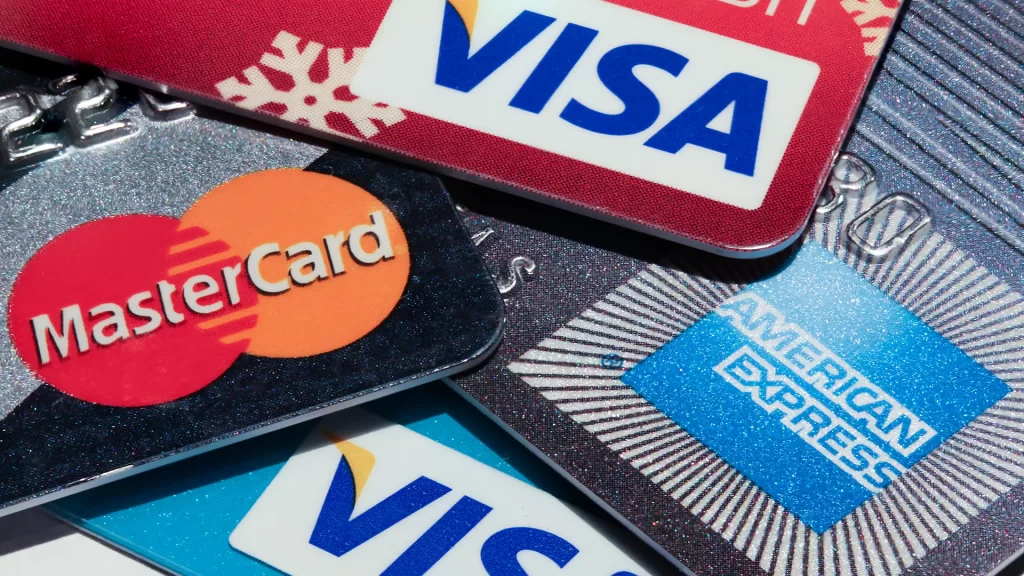Different Credit Card Types All Carders Must Know
What are Credit Cards?
Credit cards are financial tools that allow individuals to make purchases on credit. They function as a line of credit issued by a financial institution, typically a bank, which allows the cardholder to borrow funds up to a certain limit. Credit cards offer a convenient and secure method of payment, allowing users to make purchases both in-store and online. They also provide the flexibility to pay off the borrowed amount either in full or in monthly installments, depending on the cardholder’s preference and the terms and conditions of the credit card agreement. Different credit card types

Different Credit Card Types
Rewards Credit Cards
Rewards credit cards are designed to offer incentives to cardholders based on their spending. These cards typically earn reward points or cashback on eligible purchases, which can be redeemed for various rewards such as travel, merchandise, gift cards, or statement credits. Rewards credit cards are an excellent choice for individuals who frequently use their cards for everyday expenses and want to maximize their spending by earning rewards. Popular rewards credit card programs include the Chase Ultimate Rewards, American Express Membership Rewards, and Citi ThankYou Rewards.
Travel Credit Cards
Travel credit cards are tailored to meet the needs of frequent travelers. These cards often come with travel-specific benefits such as airline miles, hotel loyalty points, airport lounge access, travel insurance coverage, and waived foreign transaction fees. Travel credit cards can be co-branded with specific airlines or hotels, offering exclusive perks and accelerated rewards for purchases made with their partners. Examples of popular travel credit cards include the Chase Sapphire Preferred, American Express Platinum, and Capital One Venture.
Cashback Credit Cards
Cashback credit cards are designed to provide cardholders with a percentage of their purchases back as cash rewards. These cards offer a straightforward and tangible benefit, allowing users to earn a percentage of their spending as cash rebates. Cashback credit cards may provide higher cashback rates for specific spending categories, such as groceries, dining, or gas stations. Some cards also offer a flat rate of cashback on all purchases. Popular cashback credit cards include Citi Double Cash, Discover it Cash Back, and Capital One Quicksilver.
Student Credit Cards
Student credit cards are tailored for college students who are new to credit. These cards often have lower credit limits and offer features that help students build their credit history responsibly. Student credit cards typically have no annual fees and may offer rewards on eligible purchases. These cards can serve as a stepping stone for young adults to establish a credit history and learn responsible credit card usage. Some popular student credit cards include the Discover it Student Cash Back and the Capital One Journey Student Rewards.
Secured Credit Cards
Secured credit cards are an option for individuals with limited or damaged credit history. These cards require a security deposit that serves as collateral against the credit limit. Secured credit cards are a useful tool for building or rebuilding credit, as they report the cardholder’s payment history to credit bureaus. Over time, responsible use of a secured credit card can help improve credit scores and may eventually qualify the cardholder for an unsecured credit card. Popular secured credit cards include the Discover it Secured and the Capital One Secured Mastercard.
Balance Transfer Credit Cards
Balance transfer credit cards allow cardholders to transfer balances from one card to another, typically with a promotional interest rate. These cards are useful for individuals looking to consolidate their credit card debt and save on interest charges. Balance transfer credit cards often offer a 0% introductory APR for a specified period, allowing cardholders to pay off their transferred balances without incurring additional interest charges. It’s important to note that balance transfer credit cards may charge a balance transfer fee, usually a percentage of the transferred amount. Popular balance transfer credit cards include the Chase Slate and the Citi Simplicity.
Business Credit Cards
Business credit cards cater to the financial needs of small business owners. These cards provide tools for expense tracking, employee card management, and rewards tailored to business-related spending. Business credit cards often offer higher credit limits compared to personal credit cards and may provide rewards on business expenses such as office supplies, advertising, and travel. Some business credit cards also offer benefits like introductory 0% APR, cash flow management tools, and business-specific perks. Popular business credit cards include the American Express Business Platinum, Chase Ink Business Preferred, and Capital One Spark Cash for Business.
Charge Cards
Charge cards are similar to credit cards, but they require the cardholder to pay the balance in full each month. Unlike credit cards, charge cards do not have a preset spending limit. Instead, the card issuer determines the cardholder’s spending capacity based on their payment history, income, and creditworthiness. Charge cards are an excellent option for individuals who have the financial discipline to pay off their balances in full and prefer not to have a fixed credit limit. American Express is the primary issuer of charge cards, with their most notable offering being the American Express Gold Card.
Prepaid Cards
Prepaid cards are not technically credit cards, as they do not extend a line of credit. Instead, prepaid cards are loaded with funds by the cardholder, and the available balance is used for purchases. Prepaid cards are a convenient alternative for individuals who do not qualify for traditional credit cards or prefer to limit their spending to the amount loaded onto the card. These cards can be used for online shopping, in-store purchases, and even for withdrawing cash from ATMs. Some prepaid cards also offer additional features like direct deposit and bill payment services. Popular prepaid cards include the American Express Serve and the Visa Prepaid Debit Card.

Store Credit Cards
Store credit cards, also known as retail credit cards, are issued by specific retailers or brands. These cards offer benefits and rewards for purchases made at the issuing store or affiliated stores. Store credit cards often provide exclusive discounts, special financing options, and loyalty programs for cardholders. However, it’s important to consider the interest rates and fees associated with store credit cards, as they can be higher compared to traditional credit cards. Examples of popular store credit cards include the Target REDcard, Amazon Store Card, and Best Buy Credit Card.
Virtual Credit Cards
Virtual credit cards, also known as digital or online credit cards, are designed for secure online transactions. These cards provide a temporary card number, expiration date, and security code that can be used for online purchases. Virtual credit cards offer an extra layer of security by protecting the cardholder’s actual credit card information from potential data breaches or unauthorized transactions. This credit card type is typically offered by major credit card issuers and can be easily generated through the issuer’s online banking portal or mobile app.
Contactless Credit Cards
Contactless credit cards, also known as tap-and-go cards, use near-field communication (NFC) technology to enable quick and secure payments by simply tapping the card on a contactless-enabled payment terminal. Also, Contactless payments offer convenience and speed at the point of sale, eliminating the need for swiping or inserting the card. These cards have an embedded chip that securely communicates with the payment terminal, providing a seamless payment experience. Most modern credit cards are equipped with contactless technology, making it easier than ever to make fast and secure transactions.
Premium Credit Cards
Premium credit cards, often referred to as luxury or high-end credit cards, are designed for individuals with high incomes and excellent credit scores. These cards offer an array of premium benefits and exclusive perks, such as access to airport lounges, concierge services, travel credits, elite status with hotel and airline programs, and personalized assistance. Premium credit cards usually come with higher annual fees but provide substantial value through their extensive benefits and rewards. Examples of premium credit cards include the American Express Platinum, Chase Sapphire Reserve, and Citi Prestige.
Credit Builder Cards
Credit builder cards are specifically designed to help individuals with limited or no credit history establish a positive credit profile. These cards are accessible to individuals with lower credit scores and typically have lower credit limits. Credit builder cards often require a security deposit, which serves as collateral and reduces the risk for the card issuer. By using a credit builder card responsibly, making on-time payments, and keeping balances low, cardholders can demonstrate creditworthiness and improve their credit scores over time. Some popular credit builder cards include the Capital One Secured Mastercard and the Discover it Secured.
Low-Interest Credit Cards
Low-interest credit cards, also known as low APR cards, offer cardholders a lower ongoing interest rate compared to standard credit cards. These cards are beneficial for individuals who tend to carry a balance from month to month or want to finance larger purchases over time while minimizing interest charges. Low-interest credit cards can provide significant savings on interest expenses, especially when compared to credit cards with higher APRs. It’s important to review the terms and conditions of low-interest credit cards, as they may have specific requirements or introductory periods for the low-interest rate. Popular low-interest credit cards include the Discover it and the Citi Diamond Preferred.
Corporate Credit Cards
Corporate credit cards are issued to employees by their employers for business-related expenses. These cards provide a convenient and efficient method for managing company expenses, tracking transactions, and separating personal and business spending. Corporate credit cards offer features such as customized spending limits, expense reporting tools, and integration with accounting systems. They can help streamline the reimbursement process for employees and provide businesses with better control and visibility over their expenditures. Corporate credit cards are typically offered by major card issuers, such as American Express, Visa, and Mastercard.
Affinity Credit Cards
Affinity credit cards are co-branded credit cards that are affiliated with specific organizations, such as charities, universities, or professional associations. These cards allow cardholders to support their favorite organizations or cause through their everyday purchases. Affinity credit cards often donate a percentage of the cardholder’s spending to the affiliated organization or offer special benefits and discounts related to the organization’s activities. By using an affinity credit card, individuals can contribute to their chosen cause while enjoying the benefits and rewards provided by the card issuer.
Entertainment Credit Cards
Entertainment credit cards are designed for individuals who frequently spend on entertainment-related activities, such as dining out, movie tickets, concerts, and streaming services. These cards often offer accelerated rewards or cashback rates for entertainment-related purchases. Entertainment credit cards may also provide exclusive access to events, presale tickets, and discounts at partner establishments. If you enjoy exploring the entertainment scene and want to earn rewards while doing so, an entertainment credit card can be a valuable addition to your wallet. Popular entertainment credit cards include the Capital One Savor and the Citi Entertainment Card.
Joint Credit Cards
Joint credit cards allow two individuals to share a single credit card account. This credit card type is commonly used by spouses, partners, or family members who want to consolidate their expenses and manage their finances jointly. With a joint credit card, both individuals are equally responsible for the charges made on the card and are equally liable for repayment. Joint credit cards can simplify expense tracking and allow for the efficient management of shared finances. It’s important to establish clear communication and trust when using a joint credit card to ensure responsible and collaborative financial management.
Small Business Credit Cards
Small business credit cards are specifically designed for entrepreneurs and small business owners to manage their business expenses effectively. These cards offer features tailored to the needs of businesses, including expense tracking tools, employee card management, and rewards for business-related spending categories. Small business credit cards can help separate personal and business finances, simplify bookkeeping, and provide valuable insights into business spending patterns. Many small business credit cards also offer rewards and benefits specifically geared towards business owners, such as higher cashback rates on office supplies or advertising expenses. Popular small business credit cards include the Chase Ink Business Preferred and the American Express Blue Business Plus.
Premium Travel Credit Cards
Premium travel credit cards are the top-tier offerings in the travel credit card category. These cards are designed for frequent travelers who value luxury travel experiences and seek exclusive travel benefits. Premium travel credit cards provide extensive travel rewards, such as airline miles, hotel points, and flexible redemption options. They often include perks like airport lounge access, annual travel credits, concierge services, travel insurance coverage, and reimbursement for Global Entry or TSA PreCheck application fees. Premium travel credit cards come with higher annual fees but can provide substantial value for individuals who frequently travel in style. Notable examples of premium travel credit cards include the Chase Sapphire Reserve, the American Express Platinum, and the Citi Prestige.
Low-Annual-Fee Credit Cards
Low-annual-fee credit cards are a suitable option for individuals who want the benefits and convenience of a credit card without the burden of high annual fees. These cards offer a range of features and rewards at a more affordable cost. Low-annual-fee credit cards may provide cashback, rewards points, or travel benefits, depending on the card’s specific offerings. It’s essential to consider the overall value and benefits of the card relative to the annual fee to ensure it aligns with your spending habits and financial goals. Popular low-annual-fee credit cards include Discover it, Capital One Quicksilver, and Chase Freedom.

No-Foreign-Transaction-Fee Credit Cards
No-foreign-transaction-fee credit cards are ideal for individuals who frequently travel abroad or make international purchases. These cards eliminate the additional fees typically charged for transactions made in foreign currencies. With a no-foreign-transaction-fee credit card, you can use your card internationally without incurring extra charges, making it a cost-effective choice for global travelers. It’s important to note that while no-foreign-transaction-fee credit cards waive foreign transaction fees, they may still apply standard exchange rates for converting currencies. Popular no-foreign-transaction-fee credit cards include the Capital One Venture, the Chase Sapphire Preferred, and the Discover it.
Credit Cards for Bad Credit
Credit cards for bad credit are designed to help individuals with poor credit scores rebuild their credit history. These cards may have higher interest rates, lower credit limits, or require a security deposit as collateral. By using a credit card for bad credit responsibly, making timely payments, and keeping balances low, individuals can demonstrate improved creditworthiness over time. Some credit cards for bad credit also provide tools and resources to monitor and track credit scores, helping cardholders on their journey towards better financial health. Popular credit cards for bad credit include the Capital One Secured Mastercard and the Discover it Secured.
Cashback Credit Cards
Cashback credit cards allow cardholders to earn a percentage of their purchases as cash rewards. These cards typically offer a flat-rate cashback on all eligible purchases or higher cashback rates for specific spending categories, such as groceries, gas, or dining. Cashback rewards can be redeemed as statement credits, direct deposits, or checks, providing flexibility in how cardholders can utilize their earned rewards. Cashback credit cards are popular among individuals who want to earn tangible and straightforward rewards on their everyday spending. Notable cashback credit cards include the Chase Freedom Unlimited, the Citi Double Cash, and the Discover it Cash Back.
Student Credit Cards
Student credit cards are designed for college students who are new to credit and want to build a credit history responsibly. These cards often have lower credit limits and provide educational resources to help students understand the basics of credit management. Student credit cards can be an excellent tool for learning about responsible borrowing and developing good financial habits. Some student credit cards also offer rewards or cashback programs, encouraging positive credit behavior. It’s crucial for students to use these cards responsibly and pay their balances on time to establish a solid credit foundation. Popular student credit cards include the Discover it Student Cash Back and the Journey Student Rewards from Capital One.
Credit Cards for Travel Rewards
Credit cards for travel rewards are specifically designed for individuals who enjoy traveling and want to earn rewards for their trips. These cards often offer generous sign-up bonuses, accelerated rewards on travel-related expenses, and flexible redemption options for flights, hotels, car rentals, and more. Travel rewards credit cards can help maximize the value of your spending by earning points or miles that can be redeemed for travel-related expenses. Whether you’re a frequent flyer or an occasional vacationer, a travel rewards credit card can enhance your travel experiences and provide valuable perks. Notable travel rewards credit cards include the Chase Sapphire Preferred, the Capital One Venture, and the American Express Gold.
Secured Credit Cards
Secured credit cards are an excellent option for individuals with no credit history, limited credit, or low credit scores. These cards require a security deposit, which serves as collateral and minimizes the risk for the card issuer. Secured credit cards function similarly to traditional credit cards, allowing cardholders to make purchases and build credit history. By using a secured credit card responsibly, making on-time payments, and keeping balances low, individuals can demonstrate creditworthiness. Then eventually upgrade to unsecured credit cards. Secured credit cards are an effective tool for establishing or rebuilding credit. Popular secured credit cards include the Capital One Secured Mastercard and the Discover It Secured.
Credit Cards for Gas Rewards
Credit cards for gas rewards offer enhanced rewards or cashback rates specifically for fuel purchases. These cards are a great choice for individuals who frequently commute by car or have high gas expenses. Gas rewards credit cards typically provide higher cashback or points earnings at gas stations. And may also offer rewards for other spending categories, such as groceries or dining. If you spend a significant amount on fuel each month, a credit card for gas rewards can help you save money and earn rewards on your gas purchases. Notable credit cards for gas rewards include the Bank of America Cash Rewards, the Costco Anywhere Visa, and the Wells Fargo Propel American Express.
Balance Transfer Credit Cards
Balance transfer credit cards are designed to help individuals consolidate their credit card debt and save money on interest charges. These cards allow cardholders to transfer balances from high-interest credit cards to new cards with a lower or zero introductory APR. By transferring balances to a balance transfer credit card with a promotional 0% APR period, individuals can pay off their debt faster without accumulating additional interest charges. It’s important to consider balance transfer fees, introductory APR periods, and ongoing APRs when choosing a balance transfer credit card. Popular balance transfer credit cards include the Chase Slate, the Citi Simplicity, and the Discover it Balance Transfer.
Rewards Credit Cards
Rewards credit cards are a popular choice for individuals who want to earn valuable rewards on their everyday spending. These cards provide a variety of rewards programs, including cashback, points, or miles, which can be redeemed for travel, merchandise, or other rewards. Rewards credit cards may offer elevated rewards rates for specific spending categories, such as groceries, dining, or travel. Some cards also provide attractive sign-up bonuses, allowing cardholders to earn a significant number of rewards points or miles within the first few months of card membership. Rewards credit cards cater to different lifestyles and spending habits, ensuring that there’s a suitable option for every individual. Notable rewards credit cards include Chase Freedom Unlimited, American Express Gold, and Capital One Venture.
Popular Credit Card Issuers

Each credit card company starts its cards with a different number:
3 – American Express (AMEX)
4 – Visa
5 – MasterCard (MC)
6 – Discover (Disco)
Each card company has its own specific cards types, here are some of the basics:
Visa
- A global payment technology company that partners with financial institutions to issue Visa-branded credit cards.
- Offers diverse card options for consumers and businesses.
Classic – a universal payment tool, which was adopted worldwide in any locations designated by the logo of Visa, including ATMs, and real and virtual stores. As well as shops offering goods and services by mail and telephone. This card is intended for those who already have experience in the use of bank cards. She also enjoys popularity among consumers of middle-income, as guaranteed convenience, choice, and financial flexibility.
Gold – One of the leading products, has been adopted worldwide and allows you to enjoy impressive financial freedom (aka higher limit)
Platinum – These usually have limits over $10,000 (but remember, just because it has a high limit. It doesn’t mean it isn’t already maxed out)
Signature – No preset spending limit – great bin to get
Infinite – Most prestigious card, virtually no limit. Though there are fewer in circulation so be cautious when buying these, stick with reputable sellers!
Business – Used for small to medium-sized businesses, usually has a decent limit.
Corporate – Medium to large size businesses, larger limit than Business.
Black – limited membership, $500 annual fee, high-end card, no limit
MasterCard
Standard – comparable to visa classic
Gold – comparable to visa gold
Platinum – comparable to visa plat
World – very high limit
World Elite – virtually no limit, high-end card.
Amex
- Known for its premium services and extensive rewards programs.
- Offers a wide range of cards targeting different segments, such as travel, cashback, and business.
Gold – usually around the 10k limit
Plat – usually higher limit, around 35k
Centurion – High limit, 75k+ (also known as the black card
Discover Financial Services:
- Primarily operates in the United States.
- Known for its customer-friendly approach and cashback rewards programs.
Notable cards: Discover it Cash Back, Discover it Miles, Discover it Secured.
Conclusion
Credit card issuers offer a wide array of cards tailored to meet the diverse needs of consumers and businesses. Understanding the major credit card issuers and the different credit card type available is essential in making informed decisions when choosing a credit card. This handbook has provided a comprehensive overview, allowing readers to navigate the world of credit cards with confidence. As well as make choices that align with their financial goals.
You can also buy instant:


Cashapp Money Transfer Click here
Paypal Money Transfer Click here
Western Union Money Transfer Click here
Venmo Money Transfer Click here
Bank Money Transfer Click here to Contact Us
